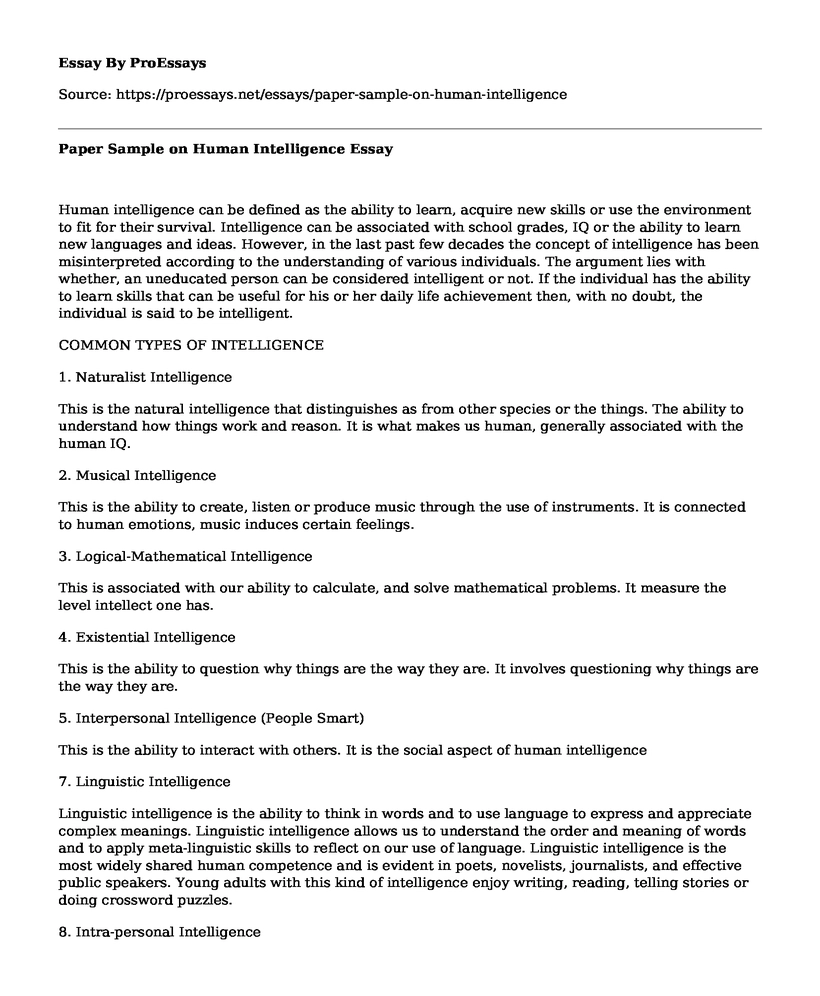Human intelligence can be defined as the ability to learn, acquire new skills or use the environment to fit for their survival. Intelligence can be associated with school grades, IQ or the ability to learn new languages and ideas. However, in the last past few decades the concept of intelligence has been misinterpreted according to the understanding of various individuals. The argument lies with whether, an uneducated person can be considered intelligent or not. If the individual has the ability to learn skills that can be useful for his or her daily life achievement then, with no doubt, the individual is said to be intelligent.
COMMON TYPES OF INTELLIGENCE
1. Naturalist Intelligence
This is the natural intelligence that distinguishes as from other species or the things. The ability to understand how things work and reason. It is what makes us human, generally associated with the human IQ.
2. Musical Intelligence
This is the ability to create, listen or produce music through the use of instruments. It is connected to human emotions, music induces certain feelings.
3. Logical-Mathematical Intelligence
This is associated with our ability to calculate, and solve mathematical problems. It measure the level intellect one has.
4. Existential Intelligence
This is the ability to question why things are the way they are. It involves questioning why things are the way they are.
5. Interpersonal Intelligence (People Smart)
This is the ability to interact with others. It is the social aspect of human intelligence
7. Linguistic Intelligence
Linguistic intelligence is the ability to think in words and to use language to express and appreciate complex meanings. Linguistic intelligence allows us to understand the order and meaning of words and to apply meta-linguistic skills to reflect on our use of language. Linguistic intelligence is the most widely shared human competence and is evident in poets, novelists, journalists, and effective public speakers. Young adults with this kind of intelligence enjoy writing, reading, telling stories or doing crossword puzzles.
8. Intra-personal Intelligence
Intra-personal intelligence is the capacity to understand oneself and ones thoughts and feelings, and to use such knowledge in planning and directioning ones life. Intra-personal intelligence involves not only an appreciation of the self, but also of the human condition. It is evident in psychologist, spiritual leaders, and philosophers. These young adults may be shy. They are very aware of their own feelings and are self-motivated.
9. Spatial Intelligence
Spatial intelligence is the ability to think in three dimensions. Core capacities include mental imagery, spatial reasoning, image manipulation, graphic and artistic skills, and an active imagination. Sailors, pilots, sculptors, painters, and architects all exhibit spatial intelligence. Young adults with this kind of intelligence may be fascinated with mazes or jigsaw puzzles, or spend free time drawing or daydreaming.
Cite this page
Paper Sample on Human Intelligence. (2021, Mar 23). Retrieved from https://proessays.net/essays/paper-sample-on-human-intelligence
If you are the original author of this essay and no longer wish to have it published on the ProEssays website, please click below to request its removal:
- Adolescent Identity and Behavior
- Research Paper on Working Parents and Children
- Essay Sample on Women Qualification: A Vital Role in Life
- Fast Fashion: Idol of Youth or Environmental Hazard? - Essay Sample
- Racial Segregation: Restricting Policies of US and Its Impact on African Americans - Essay Sample
- Essay Example on Exploring Positive Youth Justice: Assessing Claims of Uniqueness and Robustness
- Essay Example on Bullying: Power Dynamics & Its Impact on Society







